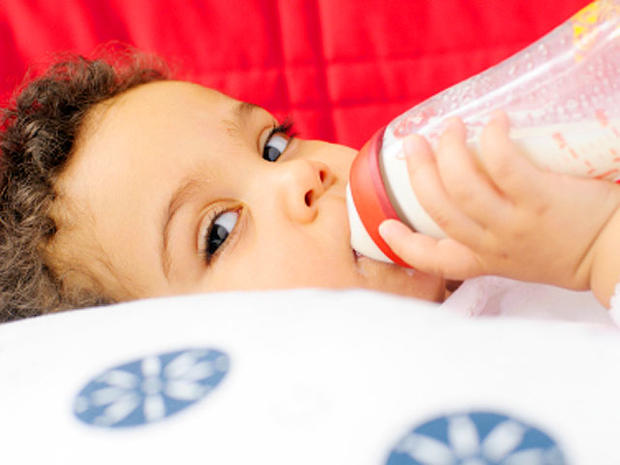Enfamil infant formula cleared in kids' bacterial infections
(CBS/AP) Enfamil powdered infant formula did not cause the rare bacterial infections that killed two newborns and sickened two others last month, health officials announced Friday. Parents can continue to use these products to feed their babies.
PICTURES: Sudden infant death: 14 ways parents raise the risk
Scientists with the CDC and FDA conducted tests on various types of powdered infant formula and distilled water, known as nursing water, and found no cases of contamination by Cronobacter sakazakii.
Four babies, including one in Missouri and another in Florida who died, were sickened by the bacteria that are found naturally in the environment and in plants such as wheat and rice.
The Missouri baby, Avery Cornett of Lebanon, Mo., died earlier this month after appearing lethargic and displaying signs of a stomach ache, CBS News reported. Tests at a Springfield hospital showed he had Cronobacter, and he died a few days later after being removed from life support.
Avery's death prompted the CDC to ask public health officials from around the country to look for other cases of Cronobacter infection among infants. That request generated reports from three other states about their cases. The boy's death prompted Wal-Mart and several other national retailers to pull Enfamil Newborn formula, which Avery had consumed before getting sick, from store shelves pending further tests. Those tests came back negative, CDC announced Friday.
The FDA said it gets four to six reports a year of infant infections related to formula and has not found a powder that tested positive since 2002. The CDC said with recent increased awareness of the illness, it has received 12 cases in 2011.
"CDC laboratory tests of samples provided by the Missouri Department of Health and Senior Services found Cronobacter bacteria in an opened container of infant formula, an opened bottle of nursery water and prepared infant formula," the agency said Friday. "It is unclear how the contamination occurred."
CDC also tested bacteria in the Illinois case and found it differed genetically from that found in the Missouri case. It said bacteria from the Oklahoma and Florida cases were not available for testing.
Cronobacter sakazakii can be treated with antibiotics, but it's deemed extremely dangerous to babies less than 1 month old and those born premature. Symptoms of a Cronobacter infection include irritability, jaundice, unstable body temperature, and difficulty eating and breathing.
Powdered infant formula is not sterile, and experts have said there are no adequate methods that completely remove or kill all bacteria that might creep into formula.
The World Health Organization recommends that parents preparing infant formula should wash their hands with soap and water, sterilize all feeding equipment in hot, soapy water and preparing enough formula for only one feeding at a time.

